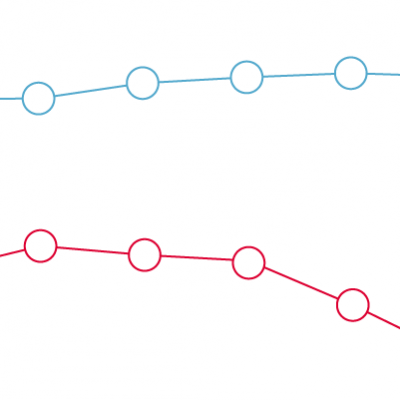Trends in bus journeys per person by region
30 October 2023

Key points
- Following the outbreak of the COVID-19 pandemic, bus journeys per person in all regions drastically decreased. The levels still haven’t recovered to pre-pandemic levels in 2021/22.
- Before the pandemic, between 1991/92 and 2019/20, bus journeys per person increased by 39% in London and 7% in the South East.
- All other regions of the UK have seen declines in bus journeys per person over the past 30 years, ranging from a decrease of 56% in the North East to a decrease of 11% in the East of England.
Bus services can support a wide range of policy objectives that are important for health, by increasing economic and social participation. In some regions, especially in rural areas and isolated communities, buses are the only means of public transport that enable people to connect with other areas.
This chart shows the percentage change in bus passenger journeys per person in each region of Great Britain, since 1991/92.
Following the outbreak of the COVID-19 pandemic, bus journeys per person in all regions drastically decreased. The levels still hadn’t recovered to pre-pandemic levels in 2021/22.
Before the pandemic, between 1991/92 and 2019/20, bus passenger journeys per person decreased by 12% in England, 41% in Scotland and 38% in Wales.
The aggregate figure for England hides large variations across different regions.
- Before the pandemic, bus passenger journeys per person had decreased by 56% in the North East, 50% in Yorkshire and the Humber, and 46% in the West Midlands. They have fallen further as a result of the pandemic.
- In London, bus passenger journeys increased by 70% between 1991/92 and 2008/09. Since then, the number of journeys had been falling up until the COVID-19 pandemic, when we saw a large drop in journeys.
- Before the pandemic, bus passenger journeys per person had increased by 7% in the South East. However, they have since fallen as a result of the pandemic.
The difference in bus travel is partly due to how different schemes operate. Bus services in London operate through Transport for London (TfL), which has introduced policies supporting greater bus use, such as the congestion charge, additional priority bus lanes, an advanced smart ticketing system, better passenger information, regulated fares and a 24-hour bus service.
Outside London, bus services were deregulated with the aim of improving services and reducing public spending through greater private sector competition. Bus routes operate for a profit, so reduced funding and use can lead to a cycle of higher prices, further falls in use and eventual closure of routes. The Bus Services Act (2017) gave metro mayors new powers to use franchising agreements in the same way as TfL has in London.
Policy action can clearly make a difference to bus provision. Providing combined local authorities with access to franchising powers could help improve local bus services. Further investment in services and policies that support bus use is also required.
- There was a break in the local bus series (outside London) due to changes in the estimation methodology from 2004/05.
Source: Health Foundation analysis of Department for Transport, Annual Bus Statistics, 1991/92 to 2021/22.







